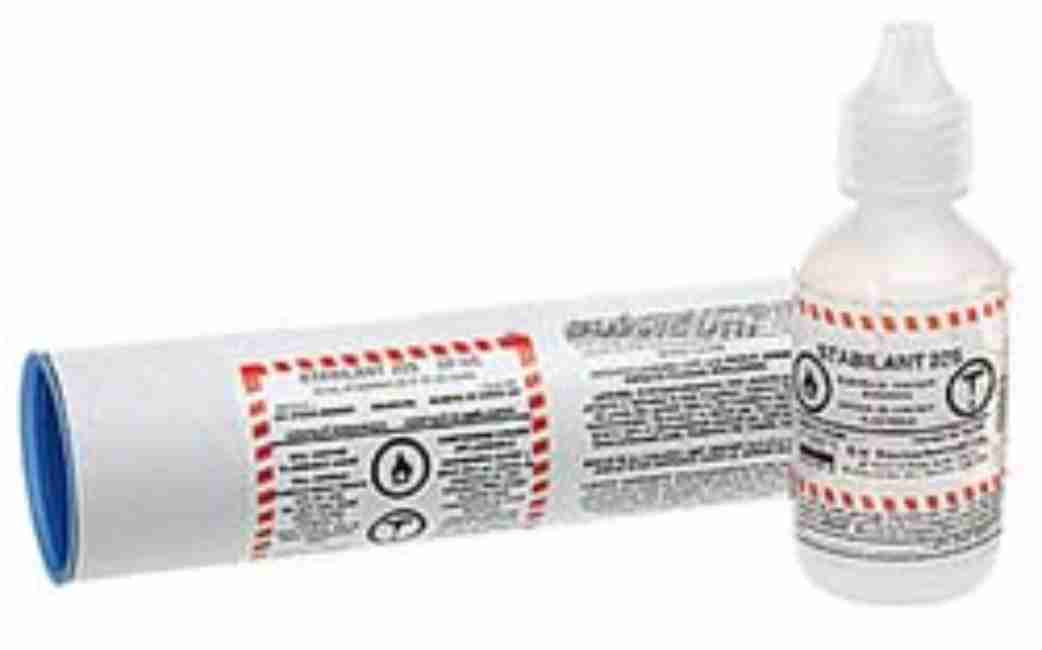
Stabilant 22 Contact Enhancement Concentrate
Stabilant 22 Concentrate is most commonly used in a diluted form for easy application. It should be diluted (4 to 1) with 99.9% alcohol (isopropanol or ethanol). The alcohol acts as a carrier, spreading the materiel evenly before evaporating to leave a 1 to 2 micron film on the contact.
Pre-diluted forms may be available on special request.
The concentrate may be used in an undiluted form in switches and other applications where extreme heat or interaction with glues are a concern.
TECHNICAL REPORTS FOR STABILANT 22
What Does Stabilant 22 Do?When a small amount of Stabilant 22 is applied to the surfaces of electro-mechanical contacts, it enhances their conductivity and provides them with the reliability of a soldered joint without bonding the contacting surfaces together! It increases the reliability of contacts by anywhere from 10 to 100 fold. Tests demonstrate that Stabilant 22 has a significant effect in lowering the harmonic distortion in connectors. Before we go any further, if you're an E.E., don't take our word for it: check out the Reviews, Technical Notes and Application Notes listed on the left and right side bars. How Long Does It Last?Stabilant has been in some applications for more than fifteen years without renewal. In most cases, the equipment on which it is used will be retired for obsolescence before it must be renewed. In addition, Stabilant has an exceptionally long shellfire. What Can Stabilant Be Used For?At the present time it is used in many different type of contacts, including microphone connectors , RTS & Dual plug patch bays, card edge connectors, D-Type connectors, MIL spec connectors, socketed ICs, signal switches, relays, Schadow-type switches and PLCC's, to name just a few! Because of its proven effectiveness in the prevention of system malfunctions, many manufacturers specify it's use in preventive maintenance programs. Check out the Application Notes provided on the right side bar. Is Stabilant Reliable?Very! They are used in electronics where equipment failure can cost lives: biomedical electronics in hospitals; air traffic control; aircraft navigation and instrument landing systems; diving; marine electrical & electronics; and front line military hardware (NATO Stock # 5999-21-909-9981). |
Will It Short Out Between Adjacent Contacts?
No! In one test, a computer mother-board ran perfectly while partially immersed in undiluted Stabilant 22! Note that the Stabilant 22 Concentrate form was used for this test. When Stabilant 22A or Stabilant 22E is used in the real world, be sure to allow for the evaporation of the alcohol which forms 4/5th's of the volume and allows for easy application. Is Stabilant Just Another Contact Cleaner?Definitely not!!! [In fact we recommend that contacts should be thoroughly cleaned before application to get the best results]. While Stabilant 22 does have a detergent action it is not sold as a cleaner, just as it has a good lubricant action but is not sold as a lubricant. Is Stabilant Right For My Application?They are being used to solve, as well as prevent problems in such diverse fields as Pro Audio Recording, Broadcasting, home stereo systems, car stereos, mobile radio, robotics, pulp and paper mills, oil fields, mining and railway operations as well as automotive, aerospace, marine electrical & electronics and military applications. Check out the Application Notes provided on the right side bar and if you still have any questions, contact us How Much Should Be Used?Very little. Normally, a film thickness of about 0.5 to 1 mils of the concentrate is more than enough. You only need enough to fill up the minute gaps within the contacts. Stabilant 22 is an electrically active material which stays resident within a contact pair, thereby enhancing conductivity without causing electrical leakage between adjacent contacts. Thus large quantities of the material do not have to be "hosed on" as is the case with cleaners. Is It Hazardous?
No, it has very low external toxicity (but we don't recommend drinking it), no skin reactions have ever been observed and the undiluted form Stabilant 22 is of low flammability. Stabilants are not subject to the Toxic Substance Control Act (TSCA) and they are not reportable under SARA Title III. |
